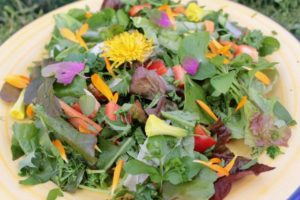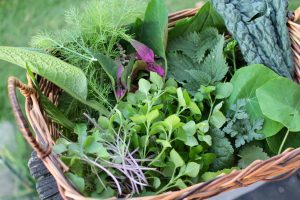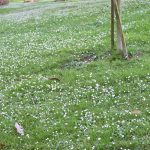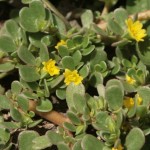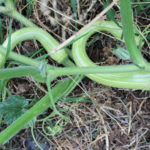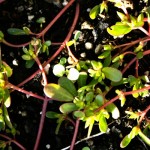This year of 2020 has been a very unusual with the lock-down time and borders still closed and all the unexpected effects on our lives. For me it has resulted in a greater interest in the wild edibles in book and seed sales and workshop attendance. See upcoming ones here. People are now thinking more deeply about how to be more self-sufficient, growing their own food and using what’s growing around them that they previously hadn’t considered.
Eating weeds for many people is a weird concept. That’s obviously because they’re not on offer in a supermarket. As a result we have turned our backs on and forgotten the planet’s huge biodiversity. There are around 80,000 edible plant species in the world and routinely we eat just 10-15 of these. What impact is this loss of diversity having on our health and our capacity to live to our fullest potential? We only have to look at the health statistics to find the answers.
We’ve forgotten some pretty fundamental things. Chiefly that we are mammals roaming a planet and entirely dependent on nature’s abundance for survival.
So what’s this all got to do with weeds? And why should we eat them?
Top 10 Reasons to Eat Weeds
1/ They are globalised plants for example amaranth, chickweed, clover, dandelion, dock, grass, knotweed, fat hen or lambs quarters, mallow, mustard, plantain, purslane, thistle, transcend continents and cultures.
2/ Eating weeds is a super-easy way to diversify our diet. Studies have shown that the more diverse our diet, the better our chances of staying healthy for a long time.
3/ They are abundant and resilient. They don’t need intensive growing systems, they grow themselves!! Perhaps the weeds are mother nature saying ‘Look, humans, look! I’m right here, in your garden, in the pavement cracks, wherever you go, here I am, trying to nourish you and make you aware of us!’
4/ Weeds thrive on soil disturbed by humans. They pull nutrients from deep beneath the earth’s surface and regenerate the soil.
5/ They are exceptionally nutritious. A dandelion growing in between the pavement cracks is probably more
nutritionally potent than crops grown through commercial agriculture which have been hybridised, sprayed and grown as mono-crops in compromised soil.
6/ Wild weeds are free, you don’t need to be wealthy to eat wholesome and truly organic food.
7/ Eating wild weeds helps us remember our connection to the planet. They offer a direct link to the wild intelligence within us. When we eat these hardy weeds they gift us their resilience and survival superpowers!
8/ Eating them instils trust in our ability to survive and thrive in harmony on the land.
9/ They are medicinal containing vitamins and minerals making them superior (and cheaper) than supplements. A side benefit is that no energy is wasted in producing, packaging and shipping, they’re local and fresh.
10/ Last but not least, now you have the perfect excuse not to mow the lawn or do any sort of arduous garden work. What was previously considered laziness is now intentionally holding a space for nature to spring forth and nourish you.
Inspired to give them a go? Be warned, these wild weeds taste…well, wild!! Your domesticated palate will need some getting used to the intensity of these plant rebels. Start with a few leaves mixed in with your regular food and they blend right in! The photos shows a salad made with wild edibles and lettuce, they don’t have to taste bitter and bad or look ugly! How pretty is this salad!!
